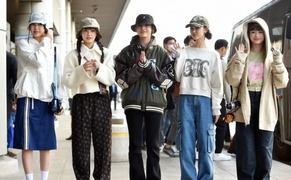 |
| Ahn Kwon-seop, the special prosecutor appointed to investigate the loss of a Bank of Korea currency strap and alleged outside pressure in the Coupang severance case, leaves his law office in Yeouido, Seoul, on November 17. / Source: Yonhap News |
A standing special counsel has been appointed to investigate allegations surrounding the loss of a Bank of Korea currency strap and alleged outside pressure not to indict in a Coupang severance pay case. With President Lee Jae-myung naming attorney Ahn Kwon-seop of Law Firm Daeryun (60, Judicial Research and Training Institute class of 25) as special counsel, the first standing special counsel in 11 years to scrutinize the prosecution itself is now fully underway. As an external investigative body prepares to look into the prosecution, advocates cite the need to “restore trust in the prosecution,” while critics frame the move as “political pressure” on prosecutors by the administration.
The presidential office said on November 17 that “President Lee Jae-myung appointed attorney Ahn as standing special counsel the previous day.” Meeting reporters in front of his office in Yeouido, Seoul, that morning, Ahn said, “I feel a heavy responsibility” and pledged to “do my utmost to fulfill the mission entrusted to me.” Asked about the appointment of assistant special counsels and the order of priority for the cases, he replied, “I have only just been appointed, so I will take time to think through everything.”
Ahn began his career as a prosecutor at the Gwangju District Prosecutors’ Office in 1996 and spent 25 years in the prosecution service. He served as head of Criminal Division 5 at the Seoul Central District Prosecutors’ Office, chief of the appellate division at the Seoul High Prosecutors’ Office and deputy chief prosecutor at the Chuncheon District Prosecutors’ Office, gaining experience across criminal, trial and special investigations. After leaving public service, he practiced at Law Firm AK and Law Firm Daeryun.
The standing special counsel system allows an investigation to begin without the separate passage of a special prosecutor act in the National Assembly. In practice, it has been invoked only once before: the 2021 special counsel probing the Sewol ferry disaster, which still went through parliamentary approval. This is the first time the Ministry of Justice has unilaterally activated a standing special counsel on its own.
The new standing special counsel team will have a 20-day preparation period, followed by an investigation lasting up to 90 days, with a single extension possible. The team will consist of one special counsel, two assistant special counsels, up to five seconded prosecutors, and up to 30 seconded public officials and 30 special investigators, for a maximum of 68 personnel. Compared with other recent special probes—such as the 60-member insurrection special counsel, the 40-member Kim Keon-hee special counsel and the 20-member Marine Corps special counsel—the scale is relatively modest.
At the core of both the currency strap case and the Coupang severance case is the question of whether the prosecution leadership exerted pressure to downplay or conceal the matters. If these allegations are substantiated, they would bolster the political case for prosecutorial reform and inevitably raise the level of pressure the government places on the prosecution.
The currency strap case dates back to December last year, when the Seoul Southern District Prosecutors’ Office seized 165 million won in cash from the home of Jeon Seong-bae—known as the shaman “Geonjin beopsa”—and later lost a Bank of Korea strap and sticker that had been wrapped around a 50 million won bundle during evidence storage. The strap and sticker carried information such as the date of verification and the name of the bank employee who checked the cash. Once it emerged that the investigator in charge had mistakenly discarded them, controversy flared over possible destruction of evidence.
After these facts came to light, the Democratic Party of Korea argued that “the prosecution intentionally discarded the items to conceal links between Jeon and former president Yoon Suk Yeol and his wife.” The Supreme Prosecutors’ Office Inspection Department raided the Seoul Southern District Prosecutors’ Office in August, seizing related materials and conducting an inquiry. It concluded that while there had been “practical negligence,” it was difficult to see the prosecution leadership as having deliberately destroyed or concealed evidence.
The alleged “Coupang severance pressure” case centers on claims that Prosecutor Eom Hee-joon of the Gwangju High Prosecutors’ Office, then head of the Bucheon branch of the Incheon District Prosecutors’ Office last April, pressured Prosecutor Moon Ji-seok (now a senior prosecutor at the Gwangju District Prosecutors’ Office) to drop charges in a case involving unpaid severance for workers at Coupang Fulfillment Services (CFS). Although the local labor office had referred the case to the prosecution with a recommendation to indict, prosecutors decided not to bring charges. Moon later went public, saying there had been “instructions from higher up.” Eom previously served on the team investigating President Lee Jae-myung in the Daejang-dong development scandal.
Observers say President Lee’s intentions are reflected in the Ministry of Justice’s decision to activate the standing special counsel. At a senior secretaries’ meeting on October 23, Lee said, “Public officials in law-enforcement agencies are covering up illegal acts or fabricating nonexistent cases, disturbing the national order. We must thoroughly uncover the truth and hold them to account,” a remark widely interpreted as aimed at Eom. The day after Lee’s comments, the ministry officially announced it would trigger the standing special counsel mechanism, saying that “although the prosecution has tried to clarify the circumstances of the two cases, questions remain unresolved.”
Jang Young-soo, emeritus professor at Korea University Law School, criticized the move as hasty. “In this case, the government jumped straight to a special counsel without fully exhausting internal inspection or preliminary investigation procedures that should precede such a step,” he said. “The original purpose of a special counsel is to take over matters that are difficult for the prosecution itself to investigate, and it is hard to say these cases rise to that level.”
He added that pushing ahead with a standing special counsel amid overlapping political controversies could “invite unnecessary political misunderstanding” when viewed in tandem with the broader debate over prosecutorial reform.
Most Read
-
1
-
2
-
3
-
4
-
5
-
6
-
7





















